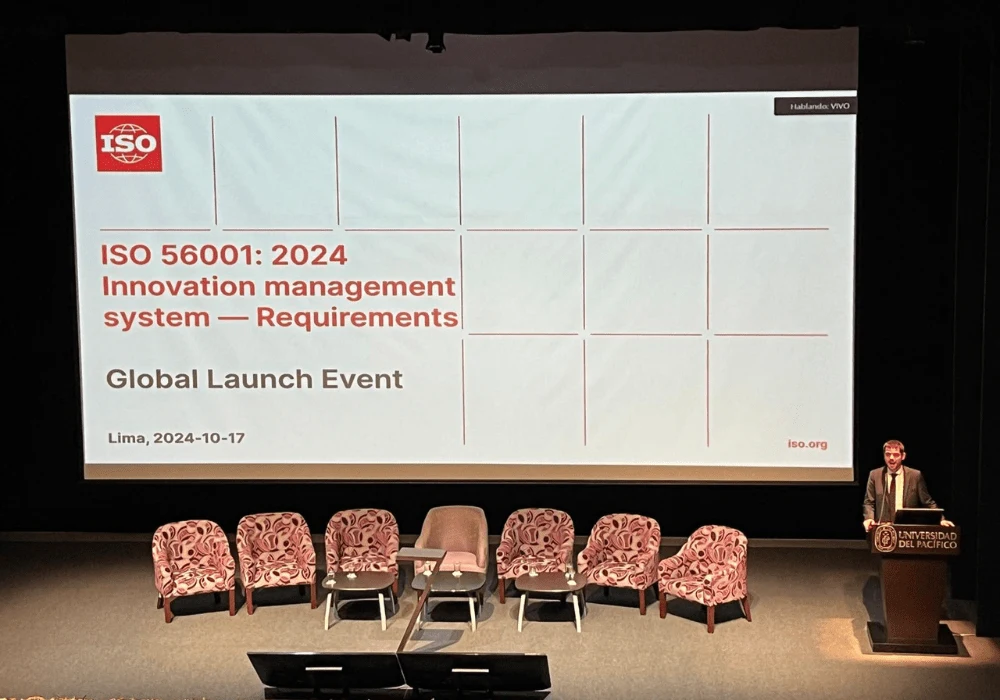In a landmark event that has cemented Peru’s place on the global innovation stage, the highly anticipated ISO 56001 was officially launched at the International Innovation Forum in Lima. This new global standard is set to revolutionise how businesses manage and scale innovation, establishing it as a vital component of competitiveness and sustainability in the modern business landscape. The event, concluding four days of intense deliberations by the ISO World Committee, highlighted Peru as an emerging leader in adopting international standards, attracting some of the most influential figures in global innovation.
Hosted by the Universidad del Pacífico, the forum “Innovation in Business DNA’s” was inaugurated by Arlette Beltrán, Vice-Rector of the university, followed by opening remarks from Sergio González Guerrero, Peru’s Minister of Production. With 270 innovation experts in attendance, the event underscored the critical role of innovation management in shaping the future of global business.

ISO56001: A Strategic Imperative for the Future
The keynote address by Alan Zettelmann, CEO of INNOCONSULT and author of Commanding Innovation, was one of the event's highlights. Zettelmann provided a visionary roadmap for embedding innovation into corporate DNA through advanced innovation management and artificial intelligence. His address emphasised that innovation management is no longer an ad-hoc effort but a strategic imperative. ISO 56001 offers a comprehensive framework for managing, measuring, and enhancing innovation processes with precision, making it as integral to business operations as ISO 9001 (quality management) and ISO 14001 (environmental management).
Zettelmann introduced the “Innovation IQ” concept, stressing that innovation should be deeply integrated into corporate strategy, not just a box to tick for compliance with ISO 56001 and 56004. He pointed out that companies with a cohesive strategy that aligns aspirations with execution tend to grow 10% faster and achieve 22% better results than their competitors. "Innovation must be part of the corporate DNA," Zettelmann asserted, drawing a powerful analogy to the evolution of workplace safety practices over the past three decades—from a marginal concern to a fundamental aspect of every operation. Similarly, he argued, innovation must become an integral part of every organizational function.
The Urgency of Structured Innovation Management
In addition to Zettelmann’s insights, the forum featured presentations from several other top speakers shaping the global innovation landscape. Johan Claire, President of ISO/TC 279 Innovation Management, shared his perspectives on maintaining a competitive edge through structured innovation. Alice de Casanove from AIRBUS Design and Space emphasised the importance of embedding innovation culture across all organisational levels. At the same time, Marco M. Alemán from WIPO highlighted the latest trends in global innovation through the Global Innovation Index 2024. Their contributions provided a broad and insightful view of how ISO 56001 can be a game-changer in various industries.
ISO 56001 in a Data-Driven World
Zettelmann’s presentation resonated deeply with the audience, particularly his use of metaphors that vividly illustrated the challenges and opportunities of adopting ISO 56001. He likened the adoption of the new standard to driving a Formula 1 car: "Companies now have the opportunity to get behind the wheel of a Formula 1, but their employees still need to graduate from karting school," he quipped, highlighting the need for proper training to harness the power of innovation without unnecessary risks.
He also described innovation culture as a fractal, where "organisations must operate like fractals, with each part containing the whole and being essential to the overall system of innovation." This imagery reinforced the idea that innovation should permeate every company level, functioning as a coherent whole from the boardroom to the frontlines.
A Strategic Tool for Long-Term Success
The event continued with a panel discussion titled “Success Repeated is Better… Perspectives on Innovation Management,” featuring Johan Claire, Sara Goldberg from UNIDO, and Vi Irie Vroh of the African Observatory for Science, Technology, and Innovation. The panel provided diverse insights into maintaining a competitive edge through innovation, further underlining the importance of ISO 56001 as a strategic tool for long-term success.
ISO 56001 is more than just a certification—it is a strategic framework that will soon become an industry standard. As global competition intensifies and compliance pressures mount, early adopters of ISO 56001 will gain a significant advantage, positioning themselves as leaders in their respective fields. Investors, regulators, and business partners are increasingly looking for organisations that demonstrate a structured approach to innovation, and ISO 56001 provides the blueprint for achieving this.
Building an Innovation Management System
Resources are readily available for organisations looking to understand and implement ISO 56001. The newly launched books Commanding Innovation, foreword by Foresight Futurist Paco Bree & Innovation By Design with a foreword by NASA astronaut Christer Fuglesang, serve as a comprehensive guide to building an Innovation Management System (IMS) that aligns with ISO 56001. These resources are essential for businesses seeking to integrate sustainable innovation strategies into their operations and stay ahead of the curve.
Conclusion: ISO 56001 as a Catalyst for Competitive Advantage
As we approach 2030, ISO 56001 is set to become the gold standard for innovation management, offering businesses a critical tool for navigating the challenges of the digital age. Organisations that embrace ISO 56001 will be better equipped to manage innovation systematically, improve decision-making, and secure a competitive edge. The future of innovation is structured, measurable, and scalable—and ISO 56001 is the key to unlocking it.
The forum concluded with closing remarks from Patricia Larios of the Universidad del Pacífico and Verónica Contreras, Director of INNOVA UP, who encouraged Peru and the world to keep innovating. This event has not only placed Peru on the global innovation map but also showcased how young talent from Latin America is gaining a foothold among the world’s innovation leaders, establishing themselves as key players in this field. For European CEOs, this development underscores the importance of international collaboration and adopting global standards like ISO 56001 to maintain and strengthen their market position in an increasingly competitive global economy.
Sources:
International Organization for Standardization






